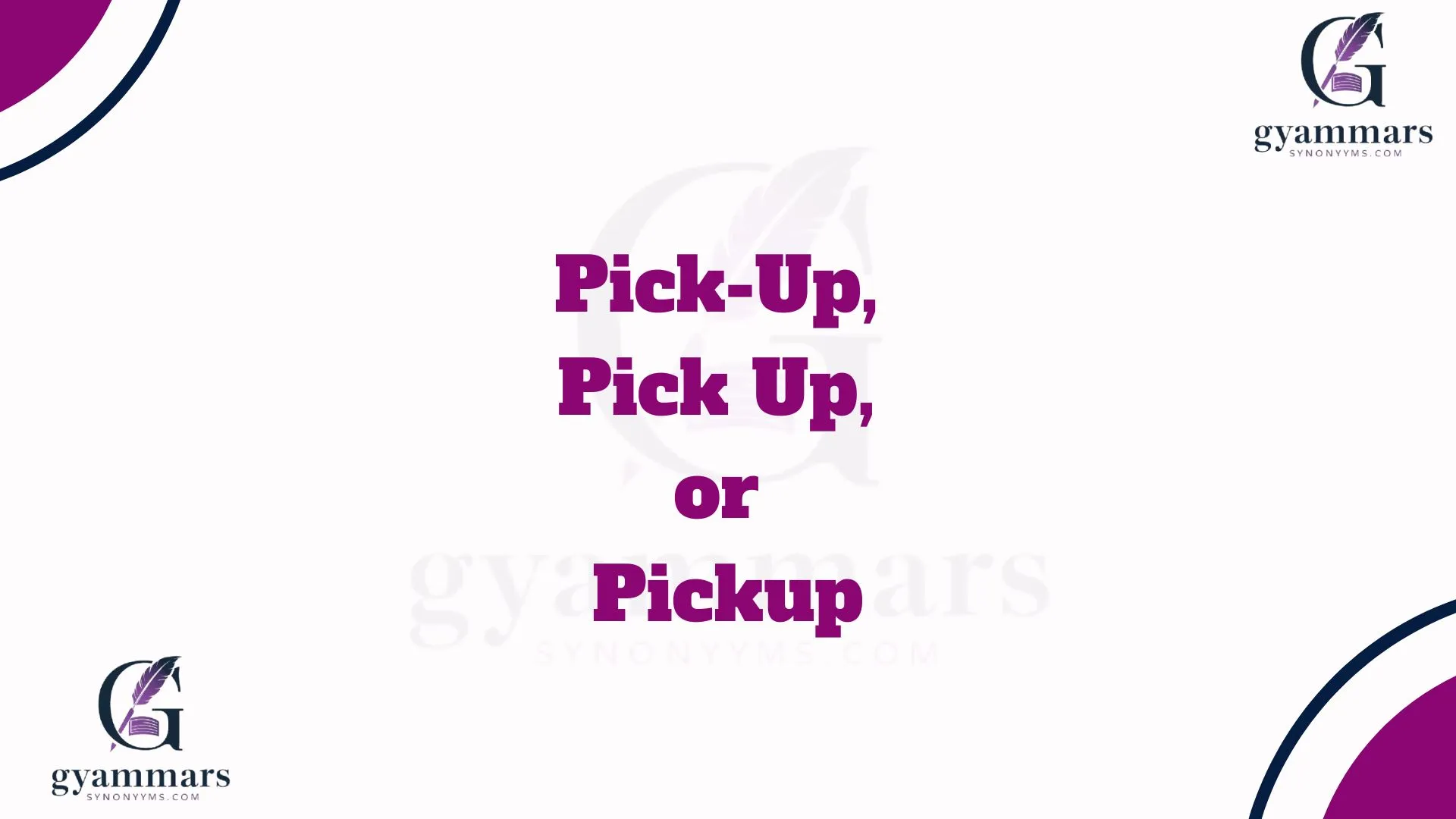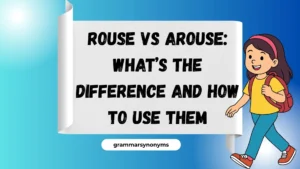English can be tricky, especially when we start to deal with words that look almost identical but have completely different meanings. For example, pick-up, pick up, and pickup often get used interchangeably, but they aren’t always the same thing. You might think they are all the same, but in reality, each one has its specific role in a sentence.
In this blog post, we’ll dive deep into the nuances of these three terms, helping you understand when and how to use each one. With the help of clear examples, explanations, and even some common mistakes, you’ll soon be able to master these phrases.
Understanding the correct usage of words like these isn’t just about grammatical precision; it’s about effective communication. Whether you’re writing an email, crafting a blog post, or drafting a business proposal, using the right terminology is key. So, let’s break down everything you need to know, step by step.
The Three Forms at a Glance
Before we jump into the details, let’s quickly review what pick-up, pick up, and pickup are, and when to use each of them.
Table: Quick Comparison
| Term | Part of Speech | Example Sentence | Usage Type |
| Pick up | Verb phrase | “I’ll pick up the kids.” | Action |
| Pick-up | Hyphenated adjective | “We need to schedule a pick-up time.” | Modifier |
| Pickup | Noun | “The pickup truck is parked outside.” | Thing/Device |
Each of these forms has its specific purpose and understanding this distinction will help you use them correctly in your own writing. Let’s take a closer look at each one in the next sections.
“Pick Up” as a Verb Phrase
One of the most common ways to use pick up is as a verb phrase. It’s an action, and it refers to the act of lifting, gathering, or retrieving something. Essentially, this is the phrase you want when you’re describing any kind of action that involves moving something from one place to another.
When to Use “Pick Up”:
- To describe a physical action: For example, “I will pick up the groceries.”
- To show improvement: “Sales began to pick up after the new product launch.”
- When discussing habits or behaviors: “She picked up a bad habit during college.”
Examples in Context:
- “Can you pick up the kids from school today?”
- “I’ll need to pick up the phone if it rings.”
- “We picked up a few new skills while working on the project.”
The key here is that pick up is a verb phrase, and it should be used when talking about actions, whether they’re literal or metaphorical.
“Pickup” as a Noun
The term pickup is used as a noun, and it refers to something you can physically touch or interact with. In this case, we’re talking about things, devices, or events. Essentially, if something is a thing or concept that can be “picked up” (like a vehicle or an event), that’s when you would use pickup.
When to Use “Pickup”:
- To describe a vehicle: “He drives a pickup truck.”
- To talk about an event or game: “Let’s play some pickup basketball.”
- To refer to a collection point: “Curbside pickup is available from 9 AM to 5 PM.”
Examples in Context:
- “He uses his pickup to transport tools to job sites.”
- “We’ll meet at the pickup point after the event.”
- “The pickup was delayed due to the weather.”
Pickup can be applied to anything that involves a collection or retrieval event. When in doubt, if you’re referring to a thing (a truck, a game, an event), go with pickup.
“Pick-Up” with a Hyphen: Still Relevant?
Now, you might be wondering, “What about pick-up with a hyphen? Is that still something I need to worry about?”
The short answer is: rarely. The hyphenated form is mostly outdated and used in specific cases. Over time, the hyphen has mostly disappeared in favor of pickup (noun) and pick up (verb phrase). However, there are still certain instances where the hyphenated form might appear, especially in specific styles or older usage.
When to Use “Pick-Up” (Hyphenated):
- In some compound nouns: For example, “pick-up game” or “pick-up line” (though “pickup” is more common now).
- As an adjective: This can be the trickiest part. The hyphen is used when the term directly modifies a noun. Example: “The pick-up truck is parked outside the store.”
Examples in Context:
- “We need to schedule a pick-up for the delivery.”
- “Let’s meet for a pick-up basketball game.”
- “His pick-up line was cringe-worthy.”
However, be mindful of your style guide, as some prefer the hyphen in specific cases. But, in most modern writing, the hyphenated form is used sparingly.
Common Mistakes and How to Avoid Them
Now that we know the definitions, let’s tackle some common mistakes people make when using these terms.
Mistakes to Watch Out For:
- Confusing the noun and verb forms: Many people mistakenly say things like, “I’ll pickup the groceries,” when it should be “I’ll pick up the groceries.”
- Using the hyphen unnecessarily: Don’t hyphenate unless it’s required for a specific reason (e.g., “pick-up line”). Using “pick-up” in place of “pickup” for nouns is incorrect.
- Inconsistent usage: Switching between the forms without thinking (e.g., “The pickup is scheduled, but I need to pick-up the package”) can confuse readers.
Fix-It Examples:
- Incorrect: “I’ll pickup the delivery at 5 PM.”
- Correct: “I’ll pick up the delivery at 5 PM.”
- Incorrect: “The pick-up is ready for you.”
- Correct: “The pickup is ready for you.”
Grammar and Style Guide Recommendations
When it comes to formal writing, grammar and style guides provide rules and recommendations for using terms like pick-up, pick up, and pickup.
- AP Style (commonly used in journalism) generally prefers pickup for the noun and pick up for the verb phrase, without the hyphen.
- Chicago Manual of Style also favors pickup for the noun and hyphenates the term in compound modifiers (e.g., pick-up game).
- Merriam-Webster suggests pickup for the noun, and pick up as the verb phrase, emphasizing the distinction.
If you’re writing for a specific brand or company, be sure to refer to their internal style guide for any deviations from these general rules.
Real-World Examples from Media, Business, and Everyday Use
Let’s look at some real-world examples of how companies, media outlets, and everyday people use these terms.
In Business:
- Companies like FedEx and UPS use “pickup” to describe a service where they collect packages. For instance, “You can schedule a pickup online for your parcel.”
- In the retail world, stores often offer pickup services: “Choose pickup in-store at checkout.”
In Sports:
- Sports brands use pickup to describe informal games. For example, “Join a pickup game at your local park.”
- Similarly, app-based services like Uber or Lyft refer to a “pickup location” when you request a ride.
In Everyday Life:
- “Can you pick up the kids?” or “I’ll pick up dinner tonight.”
- “Let’s meet at the pickup location in front of the store.”
Tips to Remember the Difference (Quick Hacks)
To make sure you’re always using the right term, here are a few memory tricks:
- If it’s a thing or a location = pickup (e.g., pickup truck, pickup location).
- If it’s an action = pick up (e.g., pick up the groceries).
- If it’s an adjective modifying a noun = pick-up (e.g., pick-up game, pick-up point).
Mnemonic to Remember:
- Pickup is a thing you can pick up.
- Pick up is the action, and you pick it up.
Final Thoughts: Say It Right, Write It Right
Whether you’re working in a professional setting, communicating with clients, or simply writing a casual email to a friend, using the correct term is crucial. Pick-up, pick up, and pickup each have their own role in language.
By remembering the simple rules above, you can avoid common mistakes and enhance your credibility. Precision in language isn’t just about grammar; it’s about making sure your message is received the way you intended. So, the next time you’re unsure about which term to use, just ask yourself: Is it an action, a thing, or a modifier?
FAQs: Pick-Up, Pick Up, or Pickup – What’s the Correct Usage?
1. What’s the difference between “pick-up,” “pick up,” and “pickup”?
- “Pick up” is a verb phrase that refers to the action of gathering or retrieving something (e.g., “I’ll pick up the groceries”).
- “Pickup” is a noun and refers to an object, vehicle, event, or action that involves retrieving or collecting something (e.g., “The pickup truck is parked outside”).
- “Pick-up” is a hyphenated adjective, though it’s used less frequently now. It modifies a noun, like in “We have a pick-up game this afternoon.”
2. When should I use “pick-up” with a hyphen?
The hyphenated form is generally used in compound adjectives or when you’re using the term as part of a multi-word modifier before a noun (e.g., “We scheduled a pick-up time for the package”). However, it’s less common than the other two forms, and many style guides recommend using “pickup” instead.
3. Can I use “pickup” instead of “pick-up” in all situations?
In most cases, yes! “Pickup” is the preferred form for nouns today, like “pickup truck” or “pickup location.” The hyphenated version, “pick-up”, is more of an older or specialized form, and it’s being phased out in favor of the simpler, unhyphenated “pickup.”
4. Is “pickup” always correct for a vehicle?
Yes, in modern English, “pickup” (without a hyphen) is the correct term for a truck with an open cargo area. For example: “I drive a pickup.” The use of the hyphen is outdated here.
5. What about “pickup game”? Should I use “pick-up” or “pickup”?
When referring to informal games, such as basketball or soccer, “pickup” (without the hyphen) is the correct form. For example, “We’re organizing a pickup game at the park.”

“Emma Rose at Grammar Synonyms is your go-to expert for everything related to language and expression. Whether you’re refining your grammar, searching for the perfect synonym, or looking for creative ways to improve your writing, Emma Rose provides the tools and inspiration you need. With a wide range of resources designed to elevate your communication, Grammar Synonyms helps you find just the right words to make every sentence shine.












